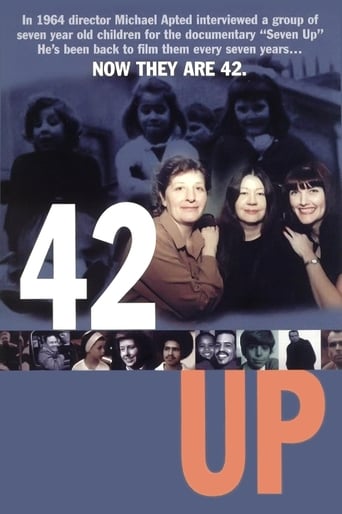runamokprods
The 'Up Series' represents one of the most fascinating and unusual uses of film in cinema history - a documentary life-long chronicle of the lives of 14 people starting at 7 years old, revisiting them every seven years through age 49 (so far). While I could quibble, wishing for a bit more depth here and there (especially with the women, where there's a bit too much emphasis on love and marriage at the expense of all else), it's really an astounding, moving, frightening and uplifting document. There's no way to watch this remarkable series of films without reflecting deeply on one's own life, and how you have changed (and stayed the same) over your own lifetime. While Michael Aped deserves every bit of credit he's received for this amazing piece of cultural anthropology, it's important to note this first film, 7 Up,was actually directed by Paul Almond, and Apted was a that point a researcher for the project.
tedg
Three things to say about this, which I consider the strongest entry in the series so far.1) The point of these things has always seemed slippery to me. Ostensibly it is a study of the British class system. In reality, they've relied on simple voyeurism, cheap familiarity. But over time Apted's personal agenda has become clear. As a Xerox of a Xerox many times over displays the structure of the imaging system, over iterations we see what the filmmaker wants us to. And its all about mothers. With the exception of the final character, the somewhat pitiful Neil, every stroke, every arc, every dive is based on the notion of motherhood. Its cheap, but at least we now know.2) There is a surprise in this one that was wholly unexpected by me. Until the last few minutes of this, we follow the model of 35 years. They exist, we see. The machinery of the film exists in our world, not theirs. Its obvious that they watch the results, but if they remark on it, it is about their participation, not the watching or making. But at the end, that takes an orthogonal shift and we see that the one soul at risk has been saved by the one soul that seems worthy, and this because of the intercession of the filming process. All of a sudden the project has become an agent in itself. Its a wonderful beam.And that is quickly followed by a series of short comments about how participation has changed their lives.3) Some of these people have grown not at all from when we saw them at 7. It isn't merely that they have not escaped their class constraints, they have literally been stillborn. Others — a few — have blossomed and matured, or changed. They still aren't interesting people in the slightest, but we do have evolution of spirit. I note this because it seems that Apted hasn't evolved at all in 35 years. The form of the thing is precisely the same. The intent, the style, the method. All as they were. There's a sameness of spirit that clouds this, as if no matter who gets married, divorced or born, life really does go on in the same way. Nothing real ever changes. Its particularly upsetting because he is us, in the bargain we make.Ted's Evaluation -- 2 of 3: Has some interesting elements.
johwarn
As a UK-born and resident who is 2 years older than the participants of this series, all I can say to Michael Apted is thank you. This series has been a record of the social, economic and cultural influences over my own life. It may surprise some of your US readers to know that there was a brief window of opportunity for working class (blue collar)kids in the late 70's and early 80's to access higher education in the UK. It is a pity that no-one in the 7up series accessed such chances as I did; now working as a forensic psychologist (having left high school at 16 with nothing worth a damn). Nevertheless, I feel enormously proud of the working class kids in the series in the way they have handled the challenges of their twenties and thirties; I am so pleased that Apted has reflected their lives without judgement. As a woman, I am equally proud of Suzie, who survived probably the most apparently 'deprived' childhood to grow into a confident, warm and happy wife and mother. Finally, who could fail to have a corner of their heart reserved for Neil and for Bruce who reached out a helping hand - these people feel like my friends. Thank you so much to all of you for sharing your lives so generously - please don't stop. I am REALLY looking forward to my next 'postcard' from you in 49 UP. You have been, and will continue to be,an inspiration to others in your simple humanity and your enormous dignity, reflected so skilfully by Michael Apted. Love him or hate him, at least he has remained loyal to this fantastic and unparallelled project.
preppy-3
I've only seen "28 Up" and "35 Up". Those were fascinating interesting films, dealing with all types of people and all types of issues in their lives. At ages 28 and 35 people are trying to see where to go what to do, etc. By 42 they're all married or bringing up kids. So the whole movie is about dealing with marriage and kids. Fascinating if you're one of two--dull if you're not. It started off well enough, but it seemed to keep rehashing itself (if I had heard ONE more comment about how hard it is to make marriage work...). About half of it was interesting, and it always a kick seeing these people literally grow up, but it's run it's course. Let's hope there's not a 49 Up!
